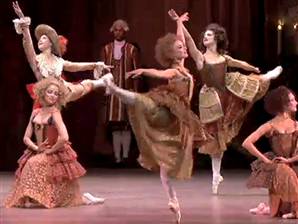Cuba’s National Symphony Gets Exposure during Royal Ballet Visit
- Submitted by: admin
- Arts and Culture
- Dance
- Entertainment
- 07 / 21 / 2009

Dancers from London’s Royal Ballet were not the only stars who made history this summer when they became the first international company to perform in Cuba in more than 30 years.
So did their distinguished orchestra conductor Martin Yates, described by critics as one of Britain’s "most exciting and versatile" conductors.
Yates led Cuba’s National Symphony for two nights in Havana’s Karl Marx Theater for the company’s production of the three-act ballet "Manon."
The excitement began when he managed to pry open the theater’s orchestra pit, which had been sealed 15 years ago when Cuba’s strapped economy forced everyone in the arts to downsize. The use of the pit was such a novelty that during intermission members of the audience crowded the front of the auditorium just for a look.
The space was far from ideal and took some creative maneuvering to accommodate over 70 musicians in the old-fashioned pit.
"The string players couldn’t even extend their bows because somebody was sitting right next to them but they would not quit," said Yates. "That extraordinary sort of fortitude was extremely uplifting."
The Cuban National Symphony, founded in 1960, has had little international exposure but more than rose to the occasion, said Yates. Prior to this engagement, the orchestra was generally unfamiliar with the ballet’s 18 century music composed by Jules Massenet.
A few months back, the Royal Ballet shipped a copy of their music book to the island and, after Yates arrived last week, the orchestra held four full rehearsals, which led to a "very accomplished execution of very complicated arrangements," said Yates.
Speaking very little Spanish, Yates was undaunted by the language barrier. "Music is such an international language. You sing a phrase or you speak the Italian in music. But you also had to speak with your hands, your eyes, your body. It was an interesting experience," said Yates who has conducted widely throughout Europe.
The orchestra should be "fiercely proud" of their performance, said Yates. The music heightened the emotions on stage, helping the audience to become absorbed by the drama. The truth of that was in the applause.
"The audience exploded with cheers before I even finished the last few measures of music," said Yates. "Normally, the public is quite respectful. You play the last chord and it’s only on the last bang when the audience explodes. They couldn’t contain themselves on the last five bars when they knew it was the end…The public just erupted into an explosion of unbelievable proportions. The musicians should be proud of that accomplishment."
And so is he.
"It’s extraordinary to work with local talent," Yates said, especially when a conductor allows a different playing technique to flourish. "It’s their individual style…and it worked. I was fiercely proud of by what we created together."
Source: NBC
So did their distinguished orchestra conductor Martin Yates, described by critics as one of Britain’s "most exciting and versatile" conductors.
Yates led Cuba’s National Symphony for two nights in Havana’s Karl Marx Theater for the company’s production of the three-act ballet "Manon."
The excitement began when he managed to pry open the theater’s orchestra pit, which had been sealed 15 years ago when Cuba’s strapped economy forced everyone in the arts to downsize. The use of the pit was such a novelty that during intermission members of the audience crowded the front of the auditorium just for a look.
The space was far from ideal and took some creative maneuvering to accommodate over 70 musicians in the old-fashioned pit.
"The string players couldn’t even extend their bows because somebody was sitting right next to them but they would not quit," said Yates. "That extraordinary sort of fortitude was extremely uplifting."
The Cuban National Symphony, founded in 1960, has had little international exposure but more than rose to the occasion, said Yates. Prior to this engagement, the orchestra was generally unfamiliar with the ballet’s 18 century music composed by Jules Massenet.
A few months back, the Royal Ballet shipped a copy of their music book to the island and, after Yates arrived last week, the orchestra held four full rehearsals, which led to a "very accomplished execution of very complicated arrangements," said Yates.
Speaking very little Spanish, Yates was undaunted by the language barrier. "Music is such an international language. You sing a phrase or you speak the Italian in music. But you also had to speak with your hands, your eyes, your body. It was an interesting experience," said Yates who has conducted widely throughout Europe.
The orchestra should be "fiercely proud" of their performance, said Yates. The music heightened the emotions on stage, helping the audience to become absorbed by the drama. The truth of that was in the applause.
"The audience exploded with cheers before I even finished the last few measures of music," said Yates. "Normally, the public is quite respectful. You play the last chord and it’s only on the last bang when the audience explodes. They couldn’t contain themselves on the last five bars when they knew it was the end…The public just erupted into an explosion of unbelievable proportions. The musicians should be proud of that accomplishment."
And so is he.
"It’s extraordinary to work with local talent," Yates said, especially when a conductor allows a different playing technique to flourish. "It’s their individual style…and it worked. I was fiercely proud of by what we created together."
Source: NBC
Comments